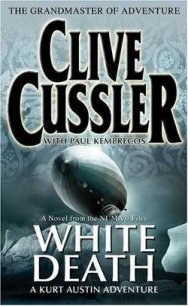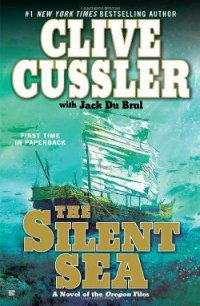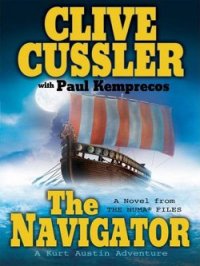Lost City - Cussler Clive (читать книги полные TXT) 📗
The ceiling burst asunder and crashed down in a crushing avalanche of huge boulders, releasing the water stored in the glacial pocket. Thousands of gallons of water poured into the confined space of the tunnel. A powerful pressure wave hit the SEA mobile and pushed it through the tunnel like a leaf through a sluice.
The wave rushed toward the entrance, carrying the vehicle on its crest.
Unaware of the drama unfolding in the dark recesses below the
glacier, the support crew had drifted back to the helicopters. The lone crewman who'd been keeping watch for the vehicle had stepped outside the tunnel for air when he heard the roar issue from the bowels of the earth. His legs reacted before his brain did and carried him away from the tunnel mouth. He was off to one side, hiding behind a boulder, when the vehicle shot out of the tunnel's entrance into the open air.
The wave's full force expended itself outside the cave, leaving the vehicle high and dry. Dazed and battered passengers untied the lines that held them and dropped off the deck. They spit out the regulators and sucked fresh air into their lungs in great coughing gulps.
Zavala was out of the cabin running back toward the tunnel. He stepped aside when a secondary, weaker wave burst from the tunnel, surged around the vehicle and disgorged a struggling figure in an orange suit. Austin's cracked face mask was askew. The communicator helmet had been ripped from his head and the force of the wave was rolling him like a ball caught in the surf.
Zavala reached down, caught Austin in mi droll and helped him to his feet.
He was as unsteady as a drunk and his eyes were as glassy as marbles. Austin spit out a mouthful of foul water and barked like a wet dog.
"Like I said, Joe. You really have to do something about your driving."
THE FRENCH rescue team arrived an hour later. The helicopter dropped down in front of the power plant like an osprey on a fish. Even before its runners had touched the ground, six dashing and rugged mountain climbers piled out the door, lugging carabiners and coils of rope. Their leader explained that they brought mountain
climbing equipment because they understood people were trapped on the glacier, not under it.
When the leader learned that his team's services were not needed, he shrugged and admitted philosophically that even a crack mountain team would have been useless in a water rescue. Then he broke out a couple of bottles of champagne he had brought along. Raising his glass high in a toast, he said there would be other opportunities; people were always getting into trouble in the mountains.
After the impromptu celebration, Austin supervised the submersible return to the Mummichug, and then he returned to the power plant with Zavala. The survivors had been shuttled to the plant for showers and hot food. Dressed in a motley assortment of borrowed clothes, they had gathered in the plant's recreation room to tell their story.
The reporters ran the videotapes of the attack on Renaud, but they were of poor quality and showed only a blurred glimpse of the gunman's face. The audiotape revealed little except for the brief exchange between Renaud and his assailant.
Austin was nursing his bumps and bruises with a bottle of Belgian beer from the power plant's larder. He sat with his chin cradled in his hand, feeling his anger grow as Skye and the others trapped in the tunnel described details of the cold-blooded act that almost condemned several innocent people to a horrible death under the ice.
"This is a matter for the police," said Drouet, the power plant supervisor, after he had heard the full story. "The authorities should be notified immediately."
Austin held his tongue. By the time the gendarmes arrived, the trail would be colder than the beer in his hand.
Renaud was anxious to leave. Brandishing his hand as if it were a fatal wound, he bullied his way and found a seat on the power plant helicopter. Rawlins and the reporters were eager to file details of
their story, which had gone far beyond the discovery of the frozen body. The reporters called in the chartered float plane that had delivered them to the glacier.
The plane's pilot cleared up one mystery. He said he'd been waiting on the lake for the reporters to return from the glacier, when a big man he had brought in showed up at the beach in LeBlanc's Citroen. The man said the other reporters were staying overnight, and that he needed a ride out immediately.
Skye watched the float plane skim across the lake for a takeoff and she broke into laughter. "Did you see Renaud? He was using his injured hand to push other people out of the way so he could get on first."
"The mocking tone of your voice suggests that you are not sorry to see Renaud leave," Austin said.
She pretended she was washing her hands. "Good riddance to bad rubbish, as my father used to say."
Lessard was standing next to Skye, and he had a sad look in his eyes as he watched the float plane leap from the lake and head toward a valley between two mountain peaks.
"Well, Monsieur Austin, I must go back to work," he said in a mournful voice. "Thank you for the excitement you and your friends have brought to this lonely outpost."
Austin grasped Lessard's hand in a firm grip. "The rescue would have been impossible without your help," Austin said. "I don't think you'll be alone for long. When the story gets out, you'll be inundated with reporters. The police will be sniffing around here as well."
Lessard looked more pleased than annoyed. "You thin so?" He beamed. "If you'll excuse me, I'd better get back to my office to prepare for visitors. I'll have a truck drive you back to the lake if you'd like."
"I'll walk with you," Skye said. "I've got to pick up something I left in the plant."
Zavala said of Lessard, "That gentleman apparently isn't content with his fifteen minutes of fame. Now, if you are through with my services "
Austin put his hand on Zavala's shoulder. "Don't tell me you want to leave this garden spot so you can to get back to Chamonix and your French pastry."
Zavala's eyes followed Skye. "It appears I'm not the only one partaking of the local delicacies?"
"You're way ahead of me, Joe. The young lady and I haven't even had our first date yet."
"Well, I'm the last guy to stand in the way of true romance." "Nor am I," Austin said, walking Zavala to the helicopter. "See you in Paris."
THE TRAFFIC JAM was horrendous even by Washington standards. Paul Trout had been sitting behind the steering wheel of his Humvee, staring with glazed eyes at the wall-to-wall carpet of cars clogging Pennsylvania Avenue, when he turned suddenly to Gamay and said, "My gills are starting to close up."
Gamay rolled her eyes in the way of a wife long used to her husband's eccentricities. She knew what was coming. Paul's family said only half-jokingly that if a Trout stayed away from his ancestral home for too long, he would start gasping for breath like a fish out of water. Therefore she wasn't surprised when he made an illegal U-turn, displaying the contempt for rules of the road that seems born into Massachusetts drivers.
While Paul drove as if he were on Desert Storm maneuvers, she used her cell phone to call the airline for reservations and to let their NUMA office know they would be away for a few days. They whirled through their Georgetown town house like twin tornadoes, packed their overnight bags and dashed to the airport.
Less than two hours after their shuttle flight landed in Boston,
they were on Cape Cod, strolling along Water Street in the village of Woods Hole, where Trout had been born and raised. Woods Hole's main thoroughfare is about a quarter of a mile long, squeezed between a salt pond and a harbor, and bordered on both sides by buildings that house organizations devoted to marine and environmental science.




